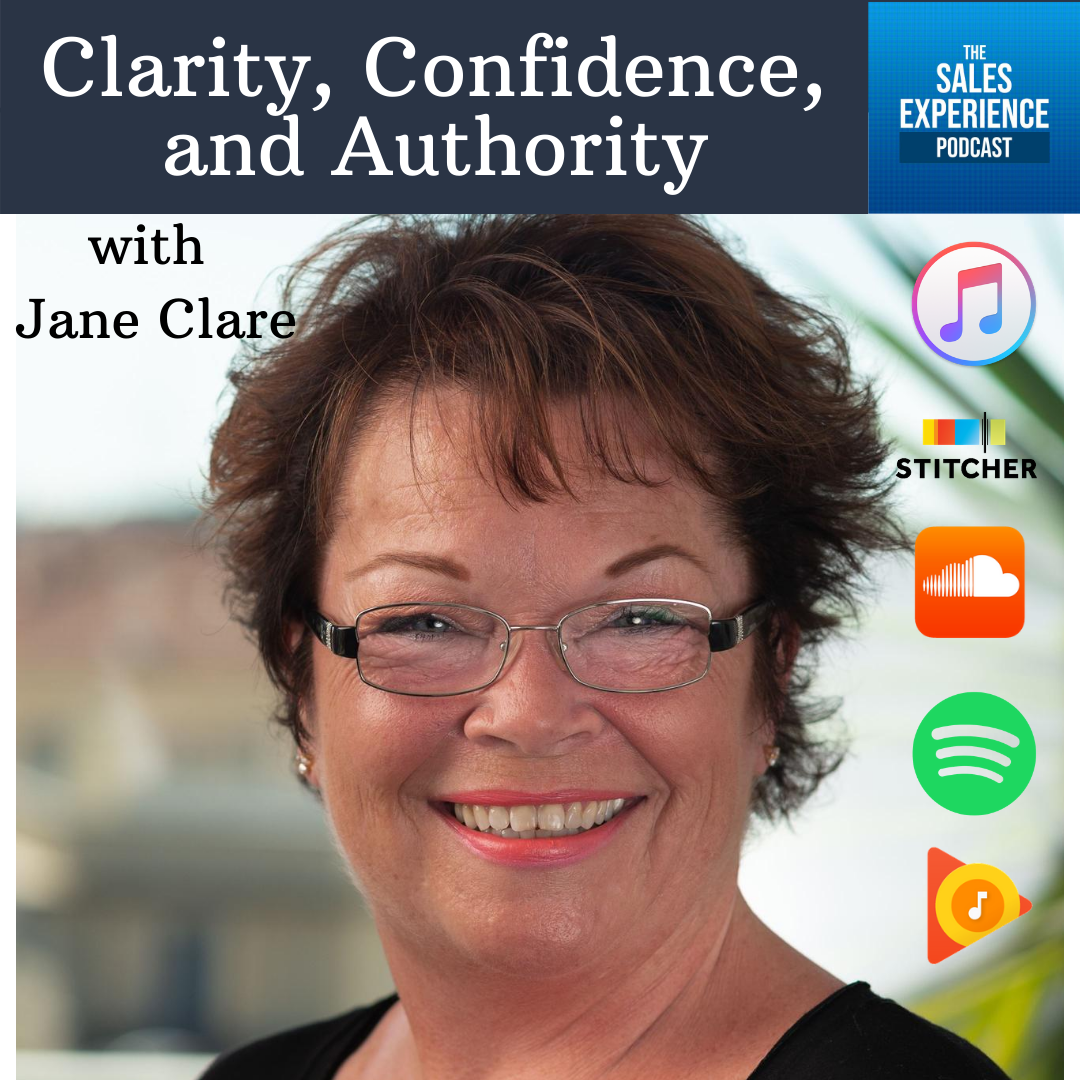Episode Transcript
Jason: Welcome back to the sales experience podcast. My name again is Jason Cutter. This is part three of my conversation with Christine Bottagaro. And if you didn't catch it, make sure to listen to the first two parts because it'll make a lot more sense, obviously, but we're going to keep on talking about sales reps, compensation plans.
Just everything from that perspective of the Chief Revenue Officer role, which I think is very important for bringing everyone together and for alignment on the team, for the team, for the company, and for the customers. So here you go. Part three. Enjoy.
Christine: All of those things. And that's why, again, it led me closer and closer to the edge of sales to say, how does this big machine work from quotas and comp through the marketing engine through to closed one and retention?
Jason: Have you found a ideal type of compensation plan for a sales rep because you could go really complex and like telephone book manual with lots of rules or super short.
Christine: I have to say I haven't seen that many Jason where I found the perfect one. And again, I would say you start with what you want to achieve and it can be even within a business year.
It doesn't have to be like, this is our corporate goal for the next millennial. But For this year, what do we want to have happen if it's organic growth and you better make sure that your comp recognizes that I think where it can get complex and where I've seen businesses make bad decisions is If you have cross product and if you're trying to do something where Jason, I want you to have quota for yes, your core product, but also if you sell this other stuff and you can handle that with spiffs and some one off, but shared quotas, they can get complex.
But where I've seen mistakes made is when people. And it could be on the CFO side, they get really parsimonious with the comp. And that's where you want to make sure, if it's a team effort, that the team is rewarded when the team succeeds. And there's this, I don't want to double comp, and that kind of mentality, I think, is fair.
But you really have to, again, say, what do we want to have happen? If we want to cross sell into our user base, we have to make sure the mechanics support that. And if an SC is A sales engineer or somebody on the tech side is very involved. Are they being comped accordingly? Or are they going to focus on install base because that's their comp plan?
So I think you can make it overly complex is one mistake. And the other is being a little bit short sighted in terms of paying for good thing to pay for it. And then maybe in a year after you've got that growth, then you revisit. Or you say, this quarter, we're going to double comp on X and Y. Wow, weird how it happens, right?
And then at the end of the quarter, you revisit it. And say, you know what, that was too expensive. Our cost of acquisition was too high. Let's talk about what that looks like to dial it down. Or give all of that quota to a SDR, BVR, ISR, something else.
Jason: No, that's a great point, Christina, and I know because I've seen so many comp plans and dealt with them, that there is that balance between complex, the complexity that's usually because you're trying to cover all the loopholes or steer the behavior in a certain way.
And salespeople are very creative. Most humans are very creative, but salespeople are very creative. So you got to be careful where you put the money and then where you put the consequences and you got to outline all that. So you can get really deep and really in the weeds and making it also really easy for them to figure out how much did they make.
That's one of the things that most successful teams will do. It's like I closed a deal. I just made X, right? Not I have to go into this formula and then I have to consult with this team. And then we have to run this program to tell me how much I might make.
Christine: I learned this from one of my previous sales partners.
And he said, there's the Denny's day that happens right after you hand out comp plans. And I never heard of this. I was like, what are you talking about? And he said, you give out your comp plans. And that's another thing is often I've seen those delayed. If you're starting the year, you better have those ready.
It can't be three months down the road. But anyway. That's a separate topic. The reps will go to Denny's and get that big pot of coffee and sit there and figure out how they're going to make their quota with what they have. Can I make it just on renewals? Can I make it just on this? That's the Denny's exercise.
And so I think you have to be cognizant of that. And again, go to what behavior do you want them to have? And at the end of it, maybe that Denny's exercise is exactly what you want the organization to do. Which is I need to go find new business or we need to retain customers. Great, but just make sure that those two are in line.
Jason: And I have rolled out many a comp plan and what I have got into the habit of doing is exactly what you're saying, but facilitating it intentionally and proactively, which is here's the comp plan. Here's how I see that you can win. And here's what we want you to focus on. And this is to the whole team based on your pipeline, based on your activities, based on what you've been doing.
If you do this, and this. You will win in this way. And this is what it will look like if you're already doing X, here's what it's going to be like in the new comp plan, focus on this, or you have options, like you said, you have renewals, you have this here's the different ways to win.
Here's what I would do for all of these. Cause my brain goes into sales mode. My brain goes into loophole finding mode, which makes me good at building the comp plan, but then also helping them win. It's here's the rules to monopoly. And here's what I would do if I wanted to win the game.
Christine: I love the, it's not handholding, but again, it's partnering.
I want to make sure that my manager, that my sales team is in lockstep with what I'm thinking. So using the whiteboard behind you and just saying, how are we going to get there? And I love one on one and think about it too, Jason. I wonder if you couldn't do like team, get all your AEs together and then you get some sharing.
And then you get maybe some good behaviors that come out that's actually, if I bring in these four and that, somebody's yeah, okay, I got four, I can target. So the power of working through that instead of here's your comp plan, go get your pot of coffee and come back with your numbers, right?
I love that partnership, that collaboration, that's pretty powerful.
Jason: And I also really always want my reps and teams to know that I know the loopholes. I know what they're going to try. I know what they're thinking. I know what I've already plugged. I know what we're watching in the reports now because we've built those as new metrics.
And don't try it, right? Raising kids, don't try it. Like we'll already, we'll know. I'll know don't and not to control them, but just to help them win. It's don't try to go over here. Here's the way we want you to go. If everyone goes this direction, we're all going to win.
Christine: I also think it will expose the motivation behind the reps.
And as you and I were talking about, I think it was a couple of weeks back, but the people that are going to be like. If I just make my number, I'm good. Like I'm close to retirement. I don't want to pick on that group of people, but that's a personal experience. Instead of the people who are like, what is it going to take for me to hit accelerator?
And then how do I get there? And I think through that exercise, Jason, as you outlined, you will identify the people who are going to try to hit their accelerators or the people that are like, okay, I'm good with this quota. And again, just understanding that maybe that's okay. Or maybe you want to put that person in a role that's more on the maintenance side or something like, I think you'll see the sales rep in a different way.
They'll show up differently.
Jason: And you put them where they want to be if you have space in your organization. If you need account management or renewals or some kind of maintenance where it's like it's not hunting, it's more farming. Then if you have the capacity, that's great. Put them there, build that team around them.
It's valuable. It's generating revenue. Hunters, killers do a terrible job at account management because they want the next big thing and they don't want a long term relationship necessarily like some of the people I'm thinking like they want short term. Yeah. And so just build it to win.
Christine: Yeah, exactly.
And that's part of the DNA, right? Is that In interviews. That's one trick I think that we have is sales and marketing people interview very well, and we all have our success stories and things. And then when they show up to work, it can look differently. So how do you find a way for them to be successful?
Finding that rep that's willing to do the cold calls, finding the rep that only wants to go out and hunt and see people face to face and putting them in a way, in a place that they can win at that,
Jason: speaking of which, because that was, this is one area I want to talk about with salespeople in particular.
How have you found a way to identify that through the interview process? Because good salespeople are mediocre and good salespeople are good at selling themselves in interviews if nothing else.
Christine: Yeah, it's true. And I think I'm always one for detail. And so people will use these platitudes or these generalities around I did this and that.
It's okay, tell me exactly how you made that happen. And then I'm pretty. Quick to figure out how involved they were, or it doesn't, that's not necessarily a good thing, or they were smart enough to say, then I knew I had to bring in my tech team. I was out of my element, but I wanted to make sure that we kept the ball rolling, blah, blah, blah.
So can you give me the details behind what happened? Or were you a little bit on the sidelines of that? How often did you talk to this customer? What did you find was the compelling event? What did you understand about their business before that first call? So I tend to hone in when somebody says.
Yeah, I got 38 percent growth in one quarter. I'm like, okay, walk me through that. Where did those leads come from? How did you manage that? Were you working with this team? And then through the details, you understand the level of involvement, their expertise, the value that they brought and what that customer interaction truly looks like.
And I always have them do an exercise too. And this is true on the marketing side is whatever the role is. You're going to present or you're going to write a paper or you're going to write some code like there is an exercise that's going to be germane to the business, but will help me understand how you approach a problem or an issue or a challenge and then how you're going to work through it and that you can tell a lot from those things.
But then at the end of the day, you hope for the best and. Sometimes you don't win. There have been some bad hires on my book. And I think one of the bigger mistakes I made Jason early on is to think that I could coach somebody through that because I'd always built high performing teams from like interns and people who are, I don't know, pharmacists, right?
Like coming from all walks of life and I could build them up, but you spend a lot of cycles on that. And at some point you're sacrificing the business and your own credibility. And I realized I was serving myself with the storyline of being that really great coach and development person versus what I really needed to deliver to the business.
And so finding that balance was a good learning for me.
Jason: I can totally relate to that. And I think there's so many leaders out there that if you, because I attribute it to myself of being always optimistic, always glasses half full, always seeing the best in people, even if they can't see it in themselves.
Which makes somebody a good coach and a good leader because you just see it and you want to encourage it. But balancing that with if they don't believe it or they're not going to put in the effort. And I'm the only one working in this relationship and seeing this possibility. That's where I've learned to draw the line and cut it off.
Which is, I know you can do this. I'm going to give you coaching. Here's your action steps. Come back when you're ready and we'll get to the next step. Or here's a book. I recommend you read it. Let me know when you've read it. And I check in a few weeks later and they're like, no, I haven't read it yet. It's okay, that's all I need to know.
Like my work is done here because you don't want to do the effort.
Christine: Yeah. It's tricky.
Jason: Are you in the fire fast or fire slow?
Christine: I think I'm leaning towards fire fast. But to your point, I want to make sure that there's a fit. Have we put somebody in a role where they cannot be successful? Have we taken somebody who's a great sales rep and made them a manager and then expect them to be a great manager?
Have we done the reverse and taken a manager and made them go out and hit the streets and they're not really comfortable with that. So some of it can be a bad decision on the organization's part, but I think you get signals pretty quickly. And when people are unhappy and that's the thing is it always feels like it's put upon like you can either turn somebody or not.
But the reality is that if they're not doing a great job, they don't feel good about it. Have that conversation. That's a Jason. No, I know you'd be a stellar. You never Bob. Yeah. You never know. That's true. Hey Bob, this really feels like a struggle lately. Tell me what's going on. And because I think we have to make a change and have that real conversation and you never know, maybe there's something on the personal side.
Like I would want to be empathetic and Hey, take some time. We'll backfill or you know what? I really love the sales ops. I want to move into that. I'm like then let's talk about that. So yeah, I think. Maybe a little faster to conversation, maybe not as fast to pull the paperwork.
Jason: All right. That's it for part three.
And as always, I will see you tomorrow for the final part of my conversation with Christine Baragaro. And if you haven't yet, make sure to look her up on LinkedIn, or you can go to resurface. io and I will catch you tomorrow. That's it for another episode of the sales experience podcast. Thank you so
much for listening.
If you find yourself on iTunes, can you leave the show a rating and a review? It helps other sales people and sales leaders find the show and please subscribe to the show and share episodes you find valuable with anyone, in sales help me on my mission of changing the way sales is done. And if you're ready to work together, go to Jason cutter.com again, that's Jason cutter. com.
To find out how I can help you or your company create scalable sales success. I will see you on the next sales experience podcast episode, and keep in mind that everything in life is sales and people remember the experience you gave them.
![[E283] Leading As A CRO, with Christine Bottagaro (Part 3)](https://episodes.castos.com/salesexperiencepodcast/images/Season-3-TSEP-Covers-1.png)


